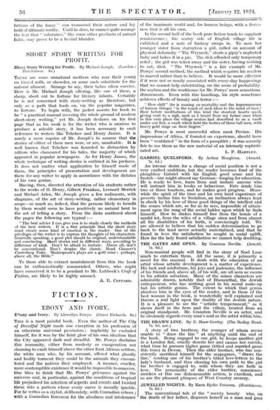An intense desire for a change of social position is
not a very exalted ambition, but the reader becomes fond of the ploughboy Gabriel with his English good sense and his Scotch--one might almost say German—longing for education. He is ready to love, learn from and imitate anyone who will instruct him in books or behaviour. Fate sends him two or three teachers, and he makes good progress. Mean- while the spirit of the time and his own hard experience of poverty incline him to Socialism, an inclination always kept in check by his love of those good things of the intellect and the senses which are, so far as he sees, impossible of attain- ment upon the rung of the social ladder upon which he finds himself. How he shakes himself free from the bonds of a sordid lot, from the wiles of a village siren and from almost all the disabilities of his birth, is convincingly told. We are allowed to believe that his sudden determination to go back to the land never actually materialized, and that he found in love the satisfaction he sought in social uplift. How far the lady found satisfaction we cannot help doubting.






































 Previous page
Previous page